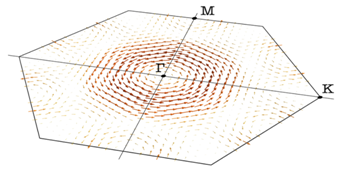Orbitronics: orbital currents induced by currents in interfacial orbital textures or by light for TeraHz emission
DIPC Seminars
- Speaker
-
Albert Fert
Université Paris-Saclay - When
-
2024/02/13
12:00 - Place
- Donostia International Physics Center (In person seminar)
- Host
- Ricardo Díez Muiño
- Add to calendar
-
iCal

In the usual situation of orbital currents coming from conversion of charge currents, I will present experiments [1] showing the strong enhancement of the current-induced torques on the Co layer of a Pt/Co bilayer by adding an Al layer on Co. The interpretation [2] comes from the calculated strong helical orbital texture at Co/Al interface, see Fig 1.

Fig.1. Helical locking of orbital moment L (arrows) with momentum k in Brillouin zone in the plane of the Co layer at the interface with Al (similar with or without Spin-Orbit coupling).
Second type of experiments [3]: light-induced teraHz emission by MgO/NM/Ni multilayers (NM = nonmagnetic metal). In contrast with results for several other ferromagnets, Ni leads to large teraHz signals with the same polarity for NM = Pt, Ta, W and also for Cu. It can be explained by light-induced orbital currents in Ni and their conversion into charge currents by Inverse Orbital Edelstein Effect at MgO/Cu interface. The emission delays gives the velocity of the orbit carriers in Cu and their decoherence time.
[1 ] S.Khrishnia, AF et al, Nanoletters 2023.
[2] S. Nikolaev, AF et al. In preparation.
[3] Y. Xu, AF et al. arXiv:2307.03490
